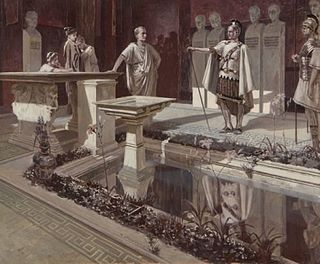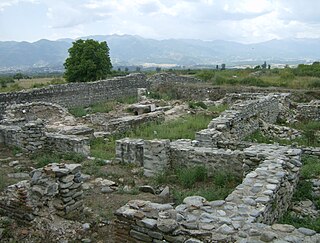Geta may refer to:
Geta may refer to:
Severus is the name of various historical and fictional figures, including:

Marcus Aurelius Antoninus, better known by his nickname Caracalla, was Roman emperor from 198 to 217 AD. He was a member of the Severan dynasty, the elder son of Emperor Septimius Severus and Empress Julia Domna. Severus proclaimed Caracalla co-ruler in 198, doing the same with his other son Geta in 209. The two brothers briefly shared power after their father's death in 211, but Caracalla soon had Geta murdered by the Praetorian Guard and became sole ruler of the Roman Empire. Julia Domna had a significant share in governance, since Caracalla found administration to be mundane. His reign featured domestic instability and external invasions by the Germanic peoples.
Bure may refer to:

Gaius Suetonius Paulinus was a Roman general best known as the commander who defeated Boudica and her army during the Boudican revolt.

Aulus Plautius was a Roman politician and general of the mid-1st century. He began the Roman conquest of Britain in 43, and became the first governor of the new province, serving from 43 to 46.

Publius Septimius Geta was Roman emperor with his father Septimius Severus and older brother Caracalla from 209 to 211. Severus died in February 211 and intended for his sons to rule together, but they proved incapable of sharing power, culminating with the murder of Geta in December of that year.
NA, N.A., Na, nA or n/a may refer to:

Clogs are a type of footwear that has a thick, rigid sole typically made of wood, although in American English, shoes with rigid soles made of other materials are also called clogs.

Geta are traditional Japanese footwear resembling flip-flops. A kind of sandal, geta have a flat wooden base elevated with up to three "teeth", held on the foot with a fabric thong, which keeps the foot raised above the ground.
Gnaeus, also spelled Cnaeus, was a Roman praenomen derived from the Latin naevus, a birthmark. It was a common name borne by many individuals throughout Roman history, including:
Gaius or Gnaeus Hosidius Geta was a Roman Senator and general who lived in the 1st century. Geta was a praetor some time before 42. In the latter year, commanding a legion, probably the Legio IX Hispana in the Africa Province, he was a part of Gaius Suetonius Paulinus' campaigns into Mauretania.
Publius may refer to:

The Severan Tondo or Berlin Tondo from c. 200 AD is one of the few preserved examples of panel painting from classical antiquity, depicting the first two generations of the imperial Severan dynasty, whose members ruled the Roman Empire in the late 2nd and early 3rd centuries. It depicts the Roman emperor Septimius Severus with his wife, the augusta Julia Domna, and their two sons and co-augusti Caracalla and Geta. The face of one of the two brothers has been deliberately erased, very likely as part of damnatio memoriae.
Titus Flavius T. f. T. n. Sabinus was a Roman politician and soldier. A native of Reate, he was the elder son of Titus Flavius Sabinus and Vespasia Polla, and brother of the Emperor Vespasian.
Sabalus was a of Berber warrior from Mauretania, North Africa who lived in the 1st century. Sabalus was one of the tribal chiefs in the Roman Client Kingdom of Mauretania. Little is known of Sabalus’ origins.
Gaius Vitorius Hosidius Geta was a Roman who lived in the 1st century AD and 2nd century AD. Geta was an only son and might have had a sister called Vitoria. His father was Roman consul and senator Marcus Vitorius Marcellus and his mother was Hosidia Geta. Geta's maternal grandfather was Roman Senator and General Gnaeus Hosidius Geta.
The gens Hosidia was a family at Rome during the last century of the Republic, and into imperial times. The most illustrious of the gens, Gnaeus Hosidius Geta, obtained the consulship in AD 47.

Nicopolis ad Nestum or Nicopolis ad Mestum, is a ruined Roman town in the province of Thracia (Thrace) near to the modern village of Garmen on the left bank of the Mesta river, in Garmen Municipality, Bulgaria. Although “ad Nestum” is the more commonly used alternative, “ad Mestum” is the correct form of the name during the Roman period.
Septimus or Septimius may refer to: